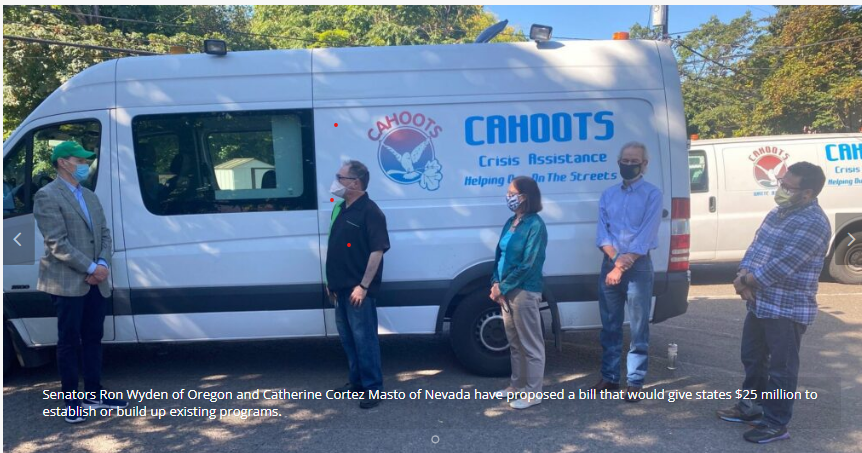9.6 Mental Health: Social Agency and Reasons to Hope
As usual, our explorations of social problems can make us depressed, even just by reading this chapter! However, there are several social programs out there designed to alleviate some of the problems outlined in this chapter.
To explore the idea of alternative approaches to addressing this problem, let us examine two programs addressing mental health access to treatment accessibility in nontraditional manners.
9.6.1 Cahoots

Figure 9.18 Cahoots: The people in this picture are working together to create solutions for mental health issues. Where do you see interdependance in their work?
The Crisis Assistance Helping Out On The Streets (CAHOOTS) program in Eugene, Oregon is a program for addressing mental health and drug-related issues integrated into the police and 911 emergency access services system operated jointly by the White Bird Clinic and the Eugene police. If you’d like to learn more, listen to the audio from a National Public Radio (NPR) story about CAHOOTS.
Its beginnings formed around an offshoot of the counterculture movement in Eugene, providing both volunteer-operated mental health services to the community and periodic role-playing seminars to the Eugene police on an informal basis on managing and defusing mental health related situations in policing. In the 1980s the police department began taking advantage of the community initiative, informally referring mental health cases to the CAHOOTS organization to reduce direct involvement of police in noncrime related scenarios. CAHOOTS volunteers offer crisis response services and access to other community services to persons experiencing mental health or drug-related issues.
Following a 2015 lawsuit against the city for excessive use of force and racial discrimination in a fatal shooting of a veteran with PTSD by the Eugene police, the incidents helped focus public attention on Eugene’s response to mental health crisis, leading to the city council committing $225,000 of the city police budget to fund 24/7 availability of the CAHOOTS services and access to the 911 dispatch system.
As the CAHOOTS organization began to respond to calls, the delays in responding to issues decreased significantly, to a level about double the time required for a response by the police. CAHOOTS estimates that in 2021, roughly 17 percent of the calls to 911 in Eugene resulted in a dispatch of a CAHOOTS team—reducing the involvement of the official police significantly. Chris Skinner, the Eugene chief of police, commented before the pandemic hit that increasing the number of CAHOOTS teams is a benefit of probability—“the less time I put police officers in conflict with people, the less time those conflicts go bad”.
In 2019, Eugene voters approved a payroll tax to bring in $23 million for additional community-safety positions. In the initial proposal, two-thirds of this money was intended to go to the police department for additional positions. Reacting to the Black Lives Matter protests, the city council instead opted to redirect that money to consider community organizations instead. CAHOOTS received some of that money, in addition to benefiting from county use of federal CARES Act funding to open a 250-bed homeless shelter in buildings on the Lane County Fairgrounds. The federal funding expired in June of 2021, but talks are in place to expand the use of some police funds to maintain the program, roughly $1 out of every $50 committed to the police budget.
9.6.2 Loveland Foundation
A different approach by the Loveland Foundation addresses resources to communities of color in a number of locations nationwide, including Texas, Georgia, California, Ohio, and New York. The Loveland Foundation was established in 2018 by Rache Cargle in response to a fundraiser for therapy support for Black women and girls.
The organization partners with organizations providing culturally-competent therapy resources for Black women and girls in the areas where they operate. The organization funds all or part of the costs of access to therapy and operates workshops for therapy providers to educate about eating disorders in Black women and girls, in partnership with the Renfrew Center for Eating Disorders. The workshops are a six part series focusing on providing the historical context, etiology, intergenerational trauma and its impact on body image, assessment, and treatment.
One unusual feature is their approach to building future therapy support resources for specifically people of color. According to the American Psychological Association, only 17 percent of the therapists in the U.S. identify as people of color, and only 3 percent identify as Black or African American. The Loveland Foundation is investing significant scholarship funding in enabling undergraduate and graduate education for BIPOC people intending to offer therapy to the BIPOC community, including addressing the use of unpaid internships and lack of dependable mentors to provide support resources to students wishing to address this need.
9.6.3 Licenses and Attributions for Mental Health: Social Agency and Reasons to Hope
“Mental Health Social Agency and Reasons to Hope” by Kate Burrows, David Boyes and Kimberly Puttman is licensed under CC BY 4.0.
Figure 9.18 Cahoots https://whitebirdclinic.org/cahoots-act-moves-forward/ on cahoots/whitebird website for publicity – Fair Use
